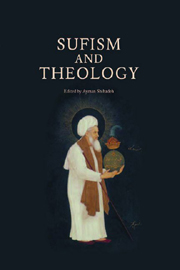Book contents
- Frontmatter
- Contents
- Contributors
- Acknowledgements
- Introduction
- Part I Mystical Theologies
- 1 Mystical Theology and the Traditionalist Hermeneutics of Maybudī's Kashf al-Asrār
- 2 The All-Comprehensive Circle (al-Iḥāṭa): Soul, Intellect, and the Oneness of Existence in the Doctrine of Ibn Sab'īn
- 3 One Aspect of the Akbarian Turn in Shī'ī Theology
- 4 Sufism and Theology in the Confessions of Ṣā'in al-Dīn Turka Iṣfahānī (d. 830/1437)
- 5 A Sufi Theology Fit for a Shī'ī King: The Gawhar-i Murād of 'Abd al-Razzāq Lāhījī (d. 1072/1661–2)
- Part II Theological Approaches to Sufism
- Index
4 - Sufism and Theology in the Confessions of Ṣā'in al-Dīn Turka Iṣfahānī (d. 830/1437)
from Part I - Mystical Theologies
Published online by Cambridge University Press: 12 September 2012
- Frontmatter
- Contents
- Contributors
- Acknowledgements
- Introduction
- Part I Mystical Theologies
- 1 Mystical Theology and the Traditionalist Hermeneutics of Maybudī's Kashf al-Asrār
- 2 The All-Comprehensive Circle (al-Iḥāṭa): Soul, Intellect, and the Oneness of Existence in the Doctrine of Ibn Sab'īn
- 3 One Aspect of the Akbarian Turn in Shī'ī Theology
- 4 Sufism and Theology in the Confessions of Ṣā'in al-Dīn Turka Iṣfahānī (d. 830/1437)
- 5 A Sufi Theology Fit for a Shī'ī King: The Gawhar-i Murād of 'Abd al-Razzāq Lāhījī (d. 1072/1661–2)
- Part II Theological Approaches to Sufism
- Index
Summary
INTRODUCTION
In the history of Islamic esotericism, Ṣā'in al-Dīn 'Alī ibn Muḥammad Turka Iṣfahānī (d. 830/1427) was a thinker of extraordinary originality whose mystical thought played a formative and fundamental role in the development of later Islamic theosophical doctrines. As S. H. Nasr points out, 'in his integration of illuminationist theosophy with Peripatetic thought and philosophical mysticism (‘irfān)’, he is ‘perhaps the most important figure in Islamic philosophy after Naṣīr al-Dīn Ṭūsī, figuring as the key link in the chain [of philosophical thought stretching] between Mullā Ṣadrā, Suhrawardī and Ibn Sīnā.’ The profound originality of Ṣa'in al-Dīn's Persian prose style, Nasr adjudicates, ‘puts him in the same rank as Nāṣir-i Khusraw, Suhrawardī, Bābā Afḍal, Naṣīr al-Dīn Ṭūsī and Quṭb al-Dīn Shīrāzī.’ Author of some thirty books and treatises in Arabic and Persian, he is yet another major Persian philosopher who awaits Western discovery, research, translation and recognition. None of his works have to date been translated into any European language.
Born circa 761/1360 in Iṣfahān, Ṣā'in al-Dīn spent his youth travelling through Syria, Egypt and the Ḥijāz in pursuit of learning. It is recorded that as part of Tīmūr's (Tamerlane) enforced intellectual brain-drain of Iṣfahānī intellectuals, he was apparently forcibly transported from his native city to Samarqand together with his older brother in the latter quarter of the 8th/14th century, although he managed to return to Iṣfahān after Tīmūr's death in 1405. It is known that he learned the fundamentals of jurisprudence at the hand of this same older brother, who was a juridical authority.
- Type
- Chapter
- Information
- Sufism and Theology , pp. 63 - 82Publisher: Edinburgh University PressPrint publication year: 2007



